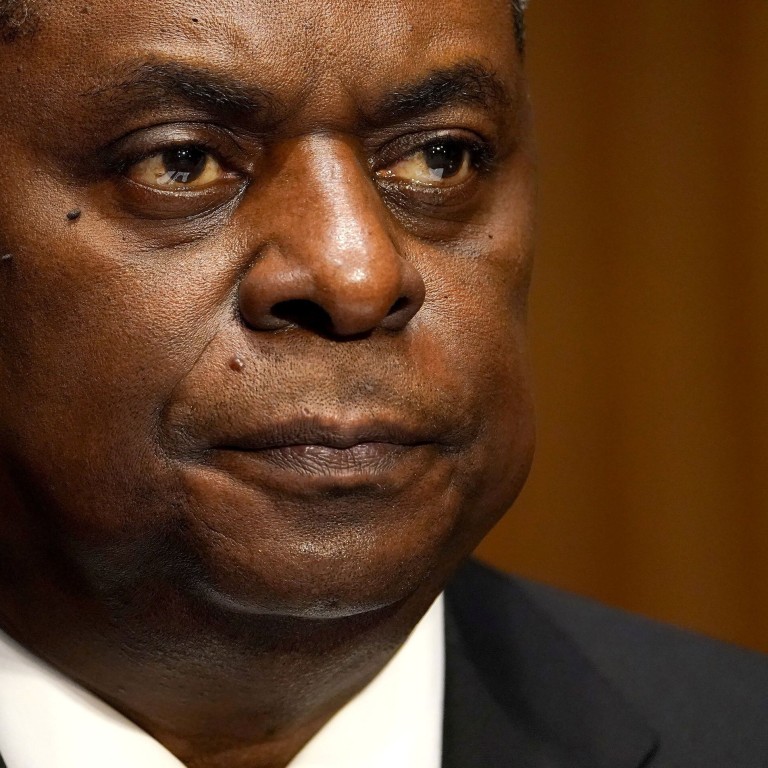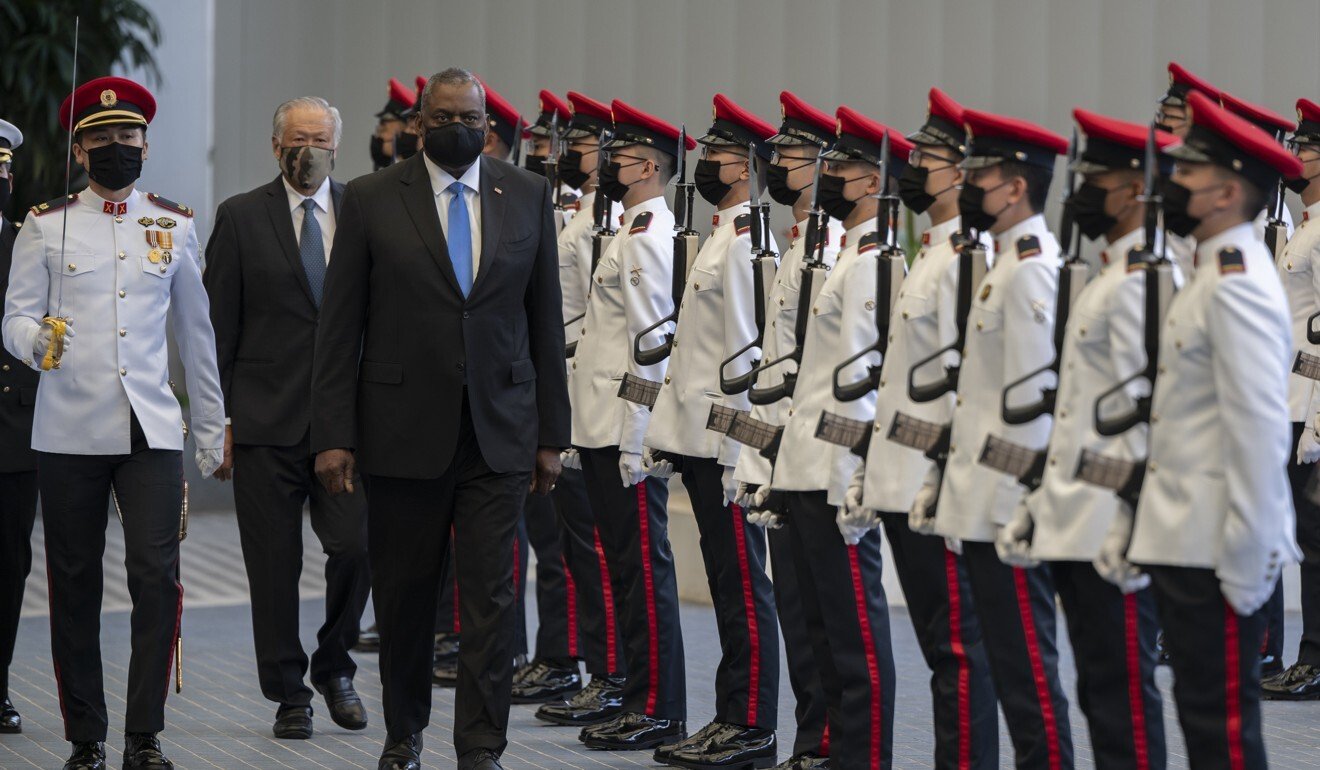
US defence secretary Lloyd Austin’s Vietnam visit to focus on maritime cooperation, distrust over wartime history
- The US and Vietnam are seeking to deepen bilateral defence ties especially in the South China Sea, says an analyst, and are expected to take steps to address wartime history
- Washington is expected to commit to helping Hanoi identify and recover the remains of soldiers from the Vietnam war
Sources say discussions on Thursday between Austin and his counterpart General Phan Van Giang in Hanoi will cover the provision of US coastguard ships to Vietnam for maritime patrols and the possibility of a third American aircraft carrier visit to signal closer strategic ties between the countries.
Austin will visit Hoa Lo prison – the “Hanoi Hilton”, as the facility was known to American pilots detained during the war – on Wednesday, before meeting Prime Minister Pham Minh Chinh and President Nguyen Xuan Phuc on Thursday morning.
US committed to ‘constructive, stable’ ties with China despite Asia stability concerns, Pentagon chief says
Both countries normalised relations in 1995 and have agreed, under successive US presidents, to cooperate more closely, including in confronting China’s expanding influence in Southeast Asia.
Le Hong Hiep, a senior fellow at the ISEAS-Yusof Ishak Institute in Singapore, said Washington and Hanoi saw each other as important partners.
“Due to China’s growing assertiveness, the two countries are now increasingly interested in pursuing deeper bilateral defence cooperation, especially in the South China Sea. The visit by Secretary Austin is aimed at driving bilateral relations in that direction,” Hiep said.

Given their history as adversaries and Hanoi’s wish to preserve relations with Beijing, US-Vietnam military cooperation has not taken place as regularly as collaboration in other areas. However, the interest in deepening defence ties has grown since 2014, after Hanoi and Beijing were embroiled in an tense stand-off in the South China Sea. China at the time deployed an oil rig for 10 weeks in waters that Vietnam considers its exclusive economic zone, sparking a major row.
The Biden administration has signalled its intentions to deepen ties with Hanoi, with Marc Knapper, the president’s nominee for the next ambassador to Vietnam, telling a Senate hearing earlier this month that there were hopes to raise their current comprehensive partnership – which encompasses a pledge to work together on a range of issues – to a strategic partnership.
“I will take steps to do that by strengthening even further our security relationships with Vietnam,” Knapper said.
As Vietnam’s coronavirus surge continues, lockdowns take their toll on factory output, small businesses
Carl Thayer, professor emeritus of politics at the University of New South Wales and a Southeast Asia expert, said Austin was likely to sound out Vietnam’s leaders on the prospect of upgrading the partnership and “learn their views on what should be priorities in their defence cooperation relationship and in dealing with Chinese assertiveness in the South China Sea”.
On his part, Thayer said, Austin would stress Washington’s commitment to stability and security in the disputed waterway and support for regional countries to stand up to Beijing. “These discussions likely will be more of an exchange of views on strategic issues, how to manage relations with China, and Vietnamese priorities for future defence cooperation.”
Dr Pham Quang Minh, former dean of the University for Social Science and Humanities in Hanoi, said there was also a possibility both sides could discuss arms sales or the transfer of military equipment.
The US in 2016 lifted a ban on the sale of lethal weapons to Vietnam, but no sales have taken place since, with Hanoi relying on Russian arms. When he visited in 2017, former US president Donald Trump urged Vietnamese leaders to buy US missiles and defence systems.

01:55
Vietnam military disinfects capital Hanoi to curb spread of Covid-19
“As a military power, the US wants to sell weapons to Vietnam,” Minh said. “Vietnam also used American weapons obtained after the Vietnam war. With US weapons, Vietnam would strengthen its defence in the face of security tensions in the South China Sea.”
This was something Beijing would monitor, he said, though it would not likely publicly oppose rapprochement over wartime history between Vietnam and the US.
Added Hiep from the ISEAS-Yusof Ishak Institute: “China does not want to see stronger defence ties between the US and Vietnam as well as other regional countries. However, the strategic dynamism in the region is currently not working in China’s favour.
“In particular, China’s growing assertiveness in the South China Sea is alienating many Southeast Asian countries and causing them to raise questions about China’s strategic intentions.”
With Vietnam now battling a surge of Covid-19 cases that has sparked lockdowns in major cities and stalled industrial production, analysts said both sides would also discuss plans to help the country boost its vaccination campaign.
US defence chief to visit security partners Philippines, Singapore, Vietnam to show commitment to Southeast Asia
Vietnam has only administered 4.8 million doses to its almost 100 million people, though it has more than 14 million doses in stock, including 5 million via the Covax Facility vaccine-sharing scheme.
Vietnam’s Ambassador to the US, Ha Kim Ngoc, said Washington was considering donating more vaccines to Vietnam, while the country had also secured deals with a Japanese drug maker to produce Covid-19 inoculations.
Former dean Minh, a respected foreign policy expert in Vietnam, said he believed Hanoi’s hosting of Austin as it was coping with a Covid-19 outbreak showed the importance it placed on ties with the US.
“In the context of Vietnam’s concentration on fighting the pandemic, that Vietnam still invites and welcomes the US Defence Secretary is a clear indication that the visit has a crucial meaning to both US and Vietnam,” he said.
“[If it was a] superficial relationship, who would visit each other in the middle of a global pandemic? This visit is the demonstration of the next level of mutual trust.”

